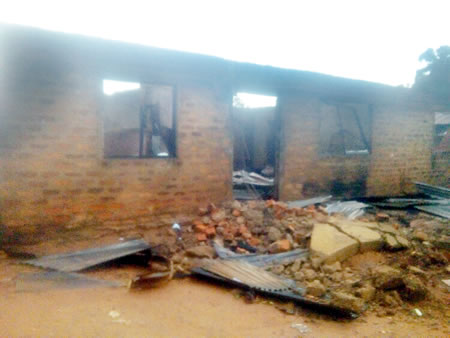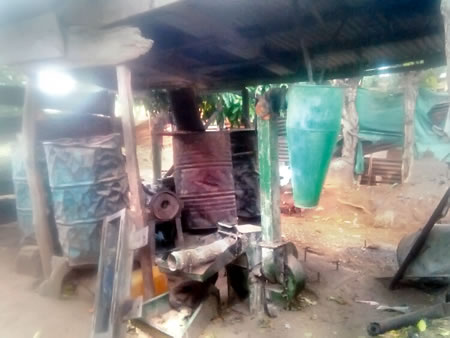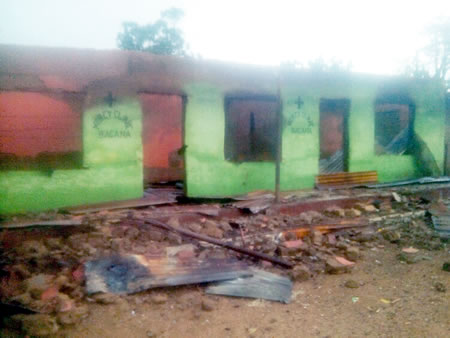
Inside Bagana: A community at war with itself

After co-existing peacefully for some time, the agitation for the control of Bagana between Agatu and Fulani has caused death and destruction in the community. Yinka Oladoyinbo reports how ethnic clashes have reduced the community and decimated its people
BAGANA, a riverside community in Omala Local Government Area of Kogi State, is at war against itself. Sadly, this silent war has been raging for some years. A recent attack even resulted in the death of some indigenes, as well as the destruction of properties.
The community of about 50, 000 people is multi-ethnic. Settlers from various ethnic groups had formed it very many years ago. These early settlers had lived in peace and worked together for the development of the community and even encouraged inter-ethnic marriage. Among the ethnic groups in Bagana are Hausa, Igala, Agatu, Fulani, Ebira Koto, Nupe, Kanuri, Kakanda and so on. No particular group saw itself as superior to the other. The community has an economy that is driven by a people who rear cattle, engage in rice farming, and also milling. Because of its strategic location, and the borders it shares with neighbouring states like Nasarawa, Benue and the Federal Capital Territory, people from these states come to Bagana to trade at its main market, which is opened for business every five days.
NURTW: Yasin unites Ejiogbe, Tokyo in Ibadan
Prior to the creation of Kogi and the new Benue states, Bagana and some other communities were in the same local government areas with the present day Agatu Local Government Area of Benue State. They lived in harmony. However, after the creation of the states, some Agatu and Fulani were ceded to Kogi, while others remained in Benue State.
That creation has, sadly, created a chasm among residents of the once united people. A visit to the community, which once enjoyed economic and social successes, revealed the semblance of a ghost town as it was tough finding inhabitants. The town was once again has been plunged into darkness following attacks orchestrated by the Agatus and the Fulani. For over three hours last Tuesday when Arewa visited Bagana, it was a graveyard of sort as eerie silence enveloped the entire community. The few houses that are standing had no occupants in them, while almost 200 buildings have either been destroyed, or set ablaze. The only sound that was heard in the community was that of birds chirping away on tree tops, while domestic animals such as goats, dogs, cats, and so on, roam the streets or waited endlessly for their owners who had either been killed, or had fled the community to return.

It was gathered that there had been pent up anger between the Agatu and Fulani, who had been involved in supremacy battle, over the ownership of the community. The incident, according to findings, started in to 2013 when the Agatu in Benue, and the Fulani also in Benue, had a crisis which led to series of attacks and deaths in the area. Some of those who fled Benue on both sides were said to have relocated to Bagana for temporary refuge till the dust raised by the attacks settled. However, aftermath the crisis, not all those who escaped to Bagana came back to their homes in Agatu.
On a market day in 2014, the Agatus allegedly invaded the cow market, said to have been operated by the Fulani. In the wake of the attack, five people and 33 cows were slaughtered. That was the first time the town would witness such an attack. Since then, the residents have been living in fear and mutual suspicion of each other.
The problem of the community was said to have been compounded by the existence of two hostile clans that have been at each other’s throat over the control of the town. The clans, Otutubatu, with headquarters in Omagede, and Ihankpe, whose headquarters is Patayin, have pockets of their people in Bagana. These clans were said to have relocated their seats of power to Bagana as their heads now control, and rule their communities from the palaces built on the soil of Bagana. Suspicious of each other, they have been trying to outsmart each other whenever it comes to laying claim to the ownership the town.
When it was discovered that the crisis would not abate, the state government created the office of the district head and that of Oga Onu Ife as a third class chief for the town. It was headed by Alhaji Ali Haruna, an Igala man, and was appointed to occupy the two posts. But the decision to create the chieftaincy did not go down well with some sections of the town. Despite this, the Agatus and the Fulanis particularly, have continued to watch their backs as the fear of attack from both camps continuously pervades the community.
When the first major attack occurred in 2014, the local government set up a committee to look into the causes of the crisis and the possible solutions. The committee, which was headed by the then Secretary to the Local Government (SLG), Julius Atabor, also had as members the district head, people from the major ethnic groups and the leader of the youth groups in the area. It was, however, gathered that the committee could not achieve much as the stakeholders were allegedly not truthful enough.
Four years and four months after the first attack, Bagana again witnessed another round of invasion from the two warring ethnic nationalities. Prior to the attack, there had been rumour of planned attack on the Fulani settlement by the Agatu, while another version said it was the Fulani that wanted to invade the Agatu community. Palpable fear enveloped the community, making people to evacuate their families to neighbouring communities in Nasarawa and Benue states. Evidence of attack was seen on some farms in Bagana as four young men were allegedly ambushed and massacred by gunmen.

On Sunday, April 7, 2019 in a reprisal, Fulani herdsmen invaded the community and killed three of the policemen that were guarding the town. They later went on to kill about 15 people, mostly women and children, and also set ablaze houses located in the Agatu-dominated area of Tge community. The following morning, the Agatus, who were caught unawares by the Fulani invasion, also carried out a counter attack, and killed some Fulani and also burnt houses that belonged to them. The destruction was said to have spread to other communities of Ogba and Patanyi, where 15 people were killed and many houses also burnt.
Investigation about the likely cause of the latest crisis has revealed nothing concrete as the warring clans have continued to blame one another as the aggressor.
The latest invasion brought wailing and sorrow to the community as the few bold young men and women found in one part of the community recounted their ordeals since the wanton destruction. One of those affected, Musa Suleman, a businessman, explained that the invasion happened the following day that Commissioner of Police visited the community and assured the inhabitants of their safety.
He said: “There have been rumours that the Fulani will invade the community. The police Area Commander had to cry to the Commissioner of Police, who later came to Bagana to sensitise the mobile men and the people in the community. He urged us to take heart that Fulani would not come. We told him that this was the rumour all over the community and we were living in fear. Almost all the houses are empty because of the rumour.
“The next day after his visit, true to their words, the Fulanis came. This was in the presence of the mobile policemen that had been stationed here. Everybody ran away,” he said.
Another returnee, Abraham Eliagwu, said they all ran away when the people came. “By the time I returned, they had burnt my house and that of my mother. They burnt all we had because we didn’t take anything when we fled. I want government to help us so that our people can come back and we can live in peace again.”

A leader of the community, Umar Ismaila, in his account of the incident, said: “The recent problem that led to the burning seen everywhere is caused by Agatu youths who always leave Benue and enter Kogi because we have a common boundary that is about three kilometres. They killed a Fulani that was staying around Obakume. The man had been living there for over 20 years. They came to stay and not long after, they asked the Fulani to come for a fight. With that threat, our people started leaving their houses in droves.
“The Fulani came one night and the Agatu ran into the bush. But they know the terrain. When the Fulani retreated, they came and started burning the empty houses. Not only that, they also killed few people in the town. Bagana people ran to Ogba. They followed them. That was around 4 o’clock. They killed eight people. Nine others are in the hospital in Abejukolo.
“It is the Agatu youths that have been attacking us. They come in their hundreds every market day and have turned this place to a war zone. A lot of houses have been burnt and our people have fled. We appeal to the government to come to our aid. We want a lasting solution to the crisis. We want the government to set up a powerful commission of inquiry. Let people come and make their submissions. Let them submit memos and also be ready to testify because we believe that some individuals are behind this and these individuals are living here with us. Until this is done, the burning and killing will not stop.”
The socio cultural organisations in Igalaland are also not left out in the efforts at investigating the dastardly act. The Coalition of Igala Community District Development Association and Socio-Cultural Organisations (CICDDASCO), while expressing worries over the level of destruction in Bagana community, also called for a total reconstruction of the community. The chairman of the coalition, Deacon Simon Agada, during an on the spot assessment of the destruction, expressed sadness over the incident. He lamented that Igala communities, known for peace and development, were fast becoming theatres of war.
“It is sorrowful to discover the level of damage that has taken place here. A lot of houses have been burnt and people have fled. We only met goats. No human beings are in this large community now. We plead with the government to wade into the matter immediately.”
Also speaking, the secretary of the group, Imah Isaac, said he was particularly happy with the security men that were on ground when they visited, “but we are not happy with the destruction in our community. Igala land has been known for being a peaceful community over the years. Going through this trauma is a pain to our people. However, as part of our recommendations, we are asking for the immediate reconstruction of this place because a lot of our people have lost, not just properties, but also those who are in IDP camps now. This is not acceptable.
“Apart from the immediate security measures, government should establish a security unit, mobile, naval base, to control movement through water, and possibly have a military barracks because the incident here has continued since 2014.”
Highlighting the possible ways of ending the crisis, Atabor said the first step would be to ask the two hostile clans of Otutubatu and Ihankpe to relocate their seats of power to their native communities.
“The second issue is economical. On every market day, no fewer than 300 engine boats come to Bagana. Each of these boats pays N1000 to these chiefs. There is also sand here. Every truck that comes to Bagana pays at least N1000 to these chiefs.
“Thirdly, let there be equality. Let’s not bring the issue of indigenes and settlers into this matter because we all are indigenes. There is no security in Bagana and its environs, not a single police presence. Of importance is a naval base because most of the crimes are committed on the river. There is also no educational facility in Bagana. When we were in Benue, we had school of fisheries. Our children went there. If the youths are educated, they won’t participate in acts of thuggery. So, let the state government resuscitate the school of fishery for us. When these things are done, naturally the crisis will end,” he stated.
The post Inside Bagana: A community at war with itself appeared first on Tribune Online.